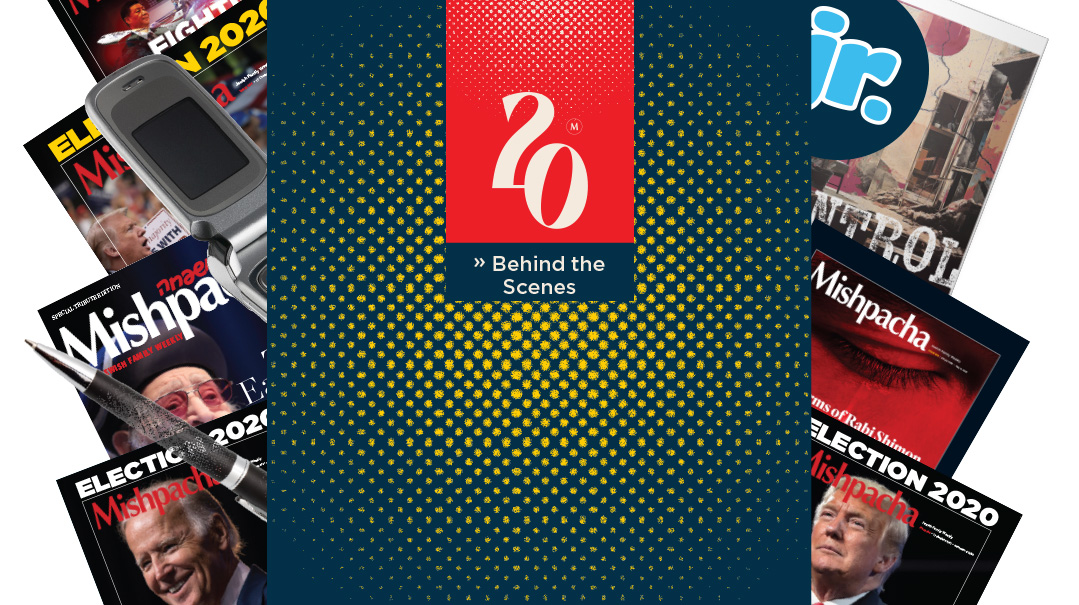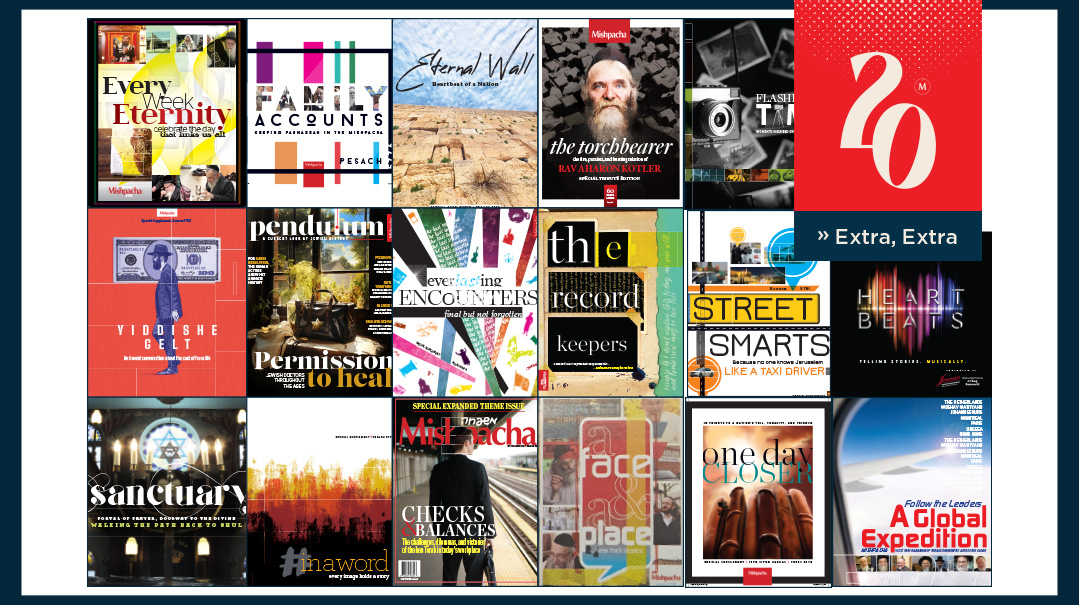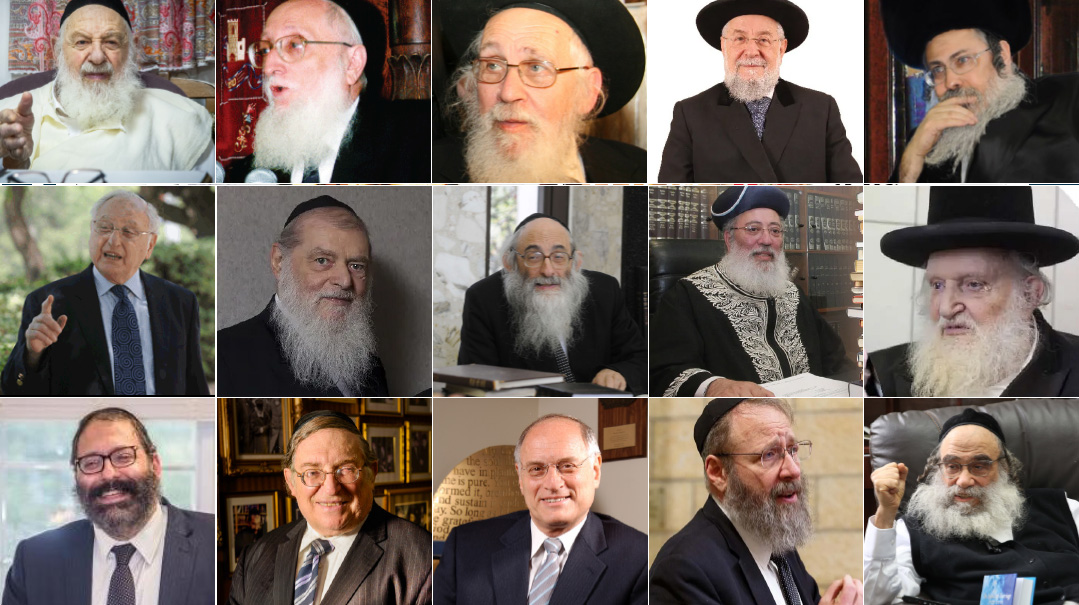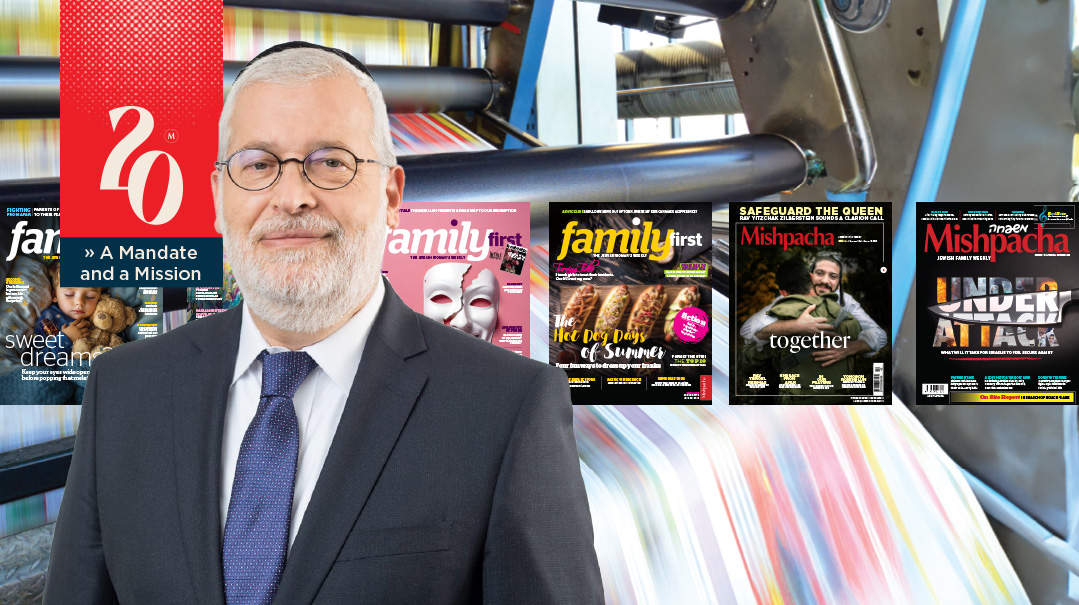Twenty Songs for 20 Years
| April 16, 2024Join us on a musical journey through the last 20 years and their hit songs
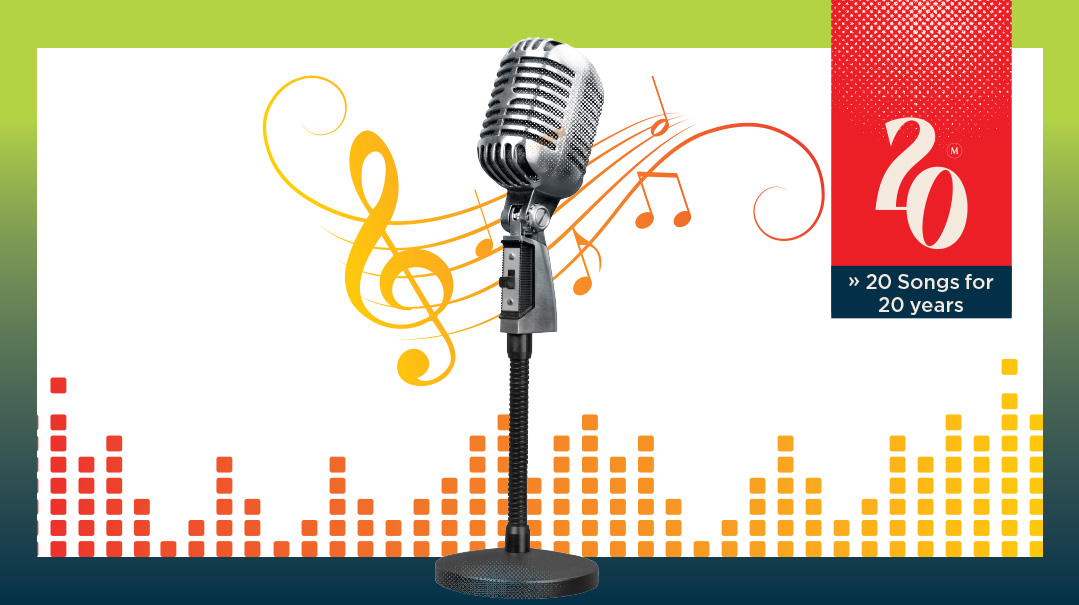
During the last two decades, Jewish music has blossomed and evolved. Iconic songs burst into popularity, kindled hype and sometimes hope, replaying on our mental soundtracks along with the high notes and challenging chords of our lives.
Join us on a musical journey through the last 20 years and their hit songs, and replay the soundtrack of these decades
2004
“Ben Bag Bag”
“Ben Bag Bag” heralded a new sound for Jewish music, with the alliterative and repetitive words a great match for the beat — and the meaning of the words generating genuine enthusiasm. In 2004, this song was as current as it gets. Shwekey’s voice hit it out of the ballpark with exceptional warmth on his Yedid album, and the credit for the tune goes to one of the Jewish world’s most prolific and versatile composers
— Pinky Weber.
2005
“L’maancha”
Eitan Katz’s first song became arguably his most famous, although it wasn’t an instantaneous hit. The popularity took time to build up, and gathered momentum after the famous “Live in Jerusalem” performance of 2014. The words, “The soul is Yours and the body is Your work, have mercy on Your labor,” are an emotional highlight of the Selichos, and Katz’s tune, composed in Elul 2003 when he was a bochur in Yeshiva Gedolah of Greater Washington in Silver Spring, captures that mood of longing for closeness and compassion every Jew feels as the new year approaches. Gentle guitar chords convey the soul’s awakening and the yearning felt during Elul’s precious window of spiritual opportunity.
2006
“Vezakeini” / “LeGabay”
Believe it or not, Baruch Levine almost didn’t make the decision that catapulted his musical career to the big leagues. Levine had long sold his compositions to other artists, but in 2006, he felt ready to pick up the mic. He had a long list of song possibilities for the album, and the last song was Vezakeini. “It sounds like I’m making this up, but I still have that paper with crossing off and question marks on it,” he says. “Vezakeini is not a musically brilliant song, and it took only ten minutes to write, so we weren’t sure that it deserved a spot.” Thankfully, he ultimately decided to include it, and it struck a chord in the hearts of a generation, voicing the universal prayer of Jewish parents facing today’s challenges.
A more playful song that emerged in 2006 was “Digi Digi Da Dum… LeGabay,” introducing eponymous new singer Dovid Gabay, and becoming his signature hit. Yitzy Bald, the composer, had Gabay in mind as he played keyboard at a vort and a few new bars of music came to his mind, becoming a composition and set to words from the Gemara “Legabay,” describing the zerizus of the Kohein Gadol. Uilleann bagpipes, the traditional national pipes of Ireland, made their one and only appearance in Jewish music on the original intro to this song.
2007
“Kodesh” / “Ma Ma Ma”
Another near miss: Shloime Gertner almost didn’t include it on his debut album Nissim until Yossi Green told him he absolutely had to release it. As soon as it hit the airwaves, Shloime Gertner’s “Kodesh hi Lachem… Malka, oy yoy Malka…” touched hearts and spread fast. Was it the wistfulness in his voice, the Shabbosdig quality of the melody — or the story of his precious special daughter behind the song?
The same year brought the dynamic “Ma Ma Ma… Ma Tovu Ohalecha Yaakov…” from Yaakov Shwekey, a fun and exciting delivery of ancient words that hooked the young and young at heart.
2008
“Vehi Sheamda” / “Anovim Anovim” / “Ochilah La’Keil”
Voted Song of the Decade by Radio Kol Chai, some fans might pick “Vehi Sheamda” as the biggest hit of the last 20 years overall. Composed by Yonatan Razel, a gifted musician/composer/singer who possesses a thorough schooling in classical music and rare genius in depth of musical expression, the melody gives voice to the tzaros and hope of Klal Yisrael. Far beyond a Pesach song, it became an anthem of strength and a promise of eternity that is relevant every day of the year. Yaakov Shwekey’s beautiful voice carried the song to fame, from “Live in Caesaria” to dozens of covers and hundreds of concerts worldwide.
“Anavim, Anavim, higia zeman…” We could almost hear the Melech HaMashiach standing on the roof of the Beis Hamikdash, calling out to us… from Yossi Green’s The 8th Note album, which was hailed as a tapestry of musical creative genius. “The time will come, and even though we’ve been waiting so long, we wait for him every day.”
Another song that appeared this year was a gem named “Ochila LaKeil,” although the plaintive prayer-set-to-music feels like it’s been part of Rosh Hashanah davening for at least two generations. Rabbi Hillel Paley contributed this beauty, which was sung by Lipa Schmeltzer on A Poshute Yid.
2009
“Omar Rabi Akiva Ashreichem” – MBD
Fans waited three years for MDB’s Kulam Ahuvim album, and when it landed, they soaked in his fusion of both stirring melodies and wedding dances. With its driving rhythm and klezmer chords, “Omar Rabbi Akiva Ashreichem” was that elusive combination of both. The perfect addition to the traditional lineup of Meron melodies, it carried thousands of weddings that year — and long after.
2010
“Ki Hirbeisa”
The era of singles was just beginning when Avrohom Fried released as a single on a CD an old Slomimer niggun by Rabbi Avraham Malovitzsky with words of exaltation and thanks from the Shir HaYichud. Its words became almost an ecstatic wave. The One Above has given us endless kindness, yet we all know the truth — what can we repay Him with, when everything is His?
2011
“Hishbati” / “Yallili”
On a little-known album called Parentches released by Dudi Kalish, “Hishbati” was presented to the public. Moving and pensive, a backbone of countless kumzitzes, especially in the yeshivah world, this three-part masterpiece took a place of honor and acclaim wherever it traveled. Belzer chassid Reb Pinchas Breier had arrived on the Jewish music scene, and his talents would have a tremendous impact. Unsurprisingly, perhaps, music is a sideline; he is a master mechanech, too.
On the other end of the Jewish music spectrum, this year saw the birth of 8th Day, with a bang. The first music video of their Chasing Prophecy album came out in 2011, and the brothers with the zany sense of humor, savvy acting skills, and brilliant lyrics offered a new vibe to the Jewish music scene. The warmth of Chabad, the solid strength behind the songs, and the modern cloak for age-old concepts are just some of the reasons to love 8th Day, and they became headliners fast.
2012
“Yesh Tikvah”
There is something so alive about Benny Friedman when he is on stage, and audiences are attracted to the energy and sunny vibrancy of his delivery. It seems like a promise, especially with a first mega-hit like “Yesh Tikvah,” composed by fellow American star Ari Goldwag and paired with sharp Hebrew lyrics by Goldwag along with Miriam Israeli. Day camps, kiruv programs, and just about everybody is singing and fist-pumping with this one, and with words full of faith, that’s got to be a good thing.
2013
“Kesser”
2013 bought the world of Jewish music another beautiful song with Belz origins — this time Reb Leizer Kalish, from a well-known musical family, offers us “Kesser,” whose words are taken from the Kedushah of Shabbos Mussaf, nusach Sephard. The song has a certain “farzaatishe” feel and an unusual 6/8 meter, and its launch via the talented Isaac Honig’s fourth album, Al Hehurim, gave it a great start. Soon “Kesser” was being requested at weddings across Chassidish, Litvish, and even Sephardic circles.
2014
“V’afilu B’hastara” / “Ke’ayal Taarog”
First composed and sung by Shaya Gross and Yoeli Klein for a yeshivah kumzitz in a forest, this song went on to carry so many people through their own personal dark forests. Rav Nachman of Breslov wrote the words “V’afilu b’hastara shebesoch ha’hastara… [Even in times of intense concealment] bevadai [with complete certainty] gam sham nimtzah Hashem Yisborach [ Hashem is also there].” Gross and Klein added another line they found in a Torah circular: “Gam me’achorei hadevarim hakashim… Ani omeid, Ani omeid, Ani omeid…” and the melody was born on the spot. “V’afilu behastarah…” was spread by the bochurim who were at that kumzitz, then Gross and Klein added it to their wedding playlist. Heads turned to catch the words, and soon every wedding featured it, including among the National-Religious crowd.
We are still in times of concealment, and perhaps it’s become even more intense since the song’s original launch — so although it may not be playing at every wedding like it was in 2014, the encouraging song is still playing across Eretz Yisrael on car speakers and at falafel stands.
Meanwhile, from the Vizhnitz heartland of Bnei Brak, a voice emerged that would take the Jewish music world by storm. Young Motty Steinmetz, with the voice of a nightingale and serious yet magnetic stage presence, was almost unknown before 2014. This year brought “Ke’ayal Taarog,” sung at Kumtantz, and the emotional “El hanaar hazeh hispalalti,” plus his dream duet with MBD in “Vesorev,” on Shlomo Yehuda Rechnitz’s first album, Shir 1. Motty has been in high demand ever since.
2015
“Ahallelu”
A beauty of an upbeat song of dveykus, suitable for siyumim, hachnassas sifrei Torah, and of course, weddings and camp dining halls, too, “Ahalelah Ahalelah Elokai… Ahoidenu, Ahoidenu” began its journey at the Skverer tishen, spiritual home of the composer Reb Yaakov Yosef Buxbaum of New Square. Then, following a chasunah in Skver, the notes were requested by Rav Yisrael of Vizhnitz. From there, it traveled on and carried the night at the wedding of the Belzer Rebbe’s third grandson.
Released as a single by Ahrele Samet, “Ahallelu” quickly caught on, generating waves of spirited dancing, shining faces, and stomping feet.
2016
“Yodati”
This one can also be hailed as a song of the decade. A long musical piece that showcases the creative musicality of Rav Breier and the still-supple voice of Avraham Fried, its words are original and head-turning. They became an expression of ultimate emunah. Baruch Levine’s version with English translation and visualisations took on a life of its own in schools and yeshivahs, and soon everyone — no matter their background or language — was singing this candid confession of mortal frailty and Divine greatness.
2017
“VeUhavtu”
“Musical chiddush” is how Meilech Kohn’s “VeUhavtu” was described when it first took over the wedding scene. Strengthening brotherly love among Jews and linking it to the promise of Mashiach, Kohn’s iconic piece rose right up to the top of the charts, until it was playing everywhere you went. Catchy and rhythmic, “VeUhavtu”’s appeal was broad and unexpected, fuelling impassioned and emotional dance circles across Litvish, chassidish, and National-Religious crowds.
2018
“Nafshi” / “Eliyahu Hanavi”
Who would have thought popular French-Israeli artist Ishay Ribo would be so warmly welcomed and widely listened to even by yeshivish crowds — let alone join chassid Motty Steinmetz for a duet produced by Ruvi Banet? “Nafshi” was written by Shmuel Yefet to bring together the Israeli spiritually-infused folk style with Steinmetz’s chassidish vocals. It wasn’t easy working with singers who sing on different scales and tones, not to speak of different pronunciations. The results? Spellbinding. A unique fusion with stunning effect.
That same year, another melody was going around in circles: “Eliyahu Hanavi, zachur latov…” It goes higher, almost shouting, then low again, almost mesmerizingly repetitive, and the singing and dancing seem to pick up energy as it goes along. The simple song, composed by Israeli Yuval Sela, went viral this year with a music video by Dudi Feldman and Sruli Lipshitz. Versatile and easy to learn, it was embraced from kumzitzes to wedding dance circles.
2019
“Thank You Hashem”
The melody that started a movement, “Thank You Hashem,” paired the Blumstein brothers’ talents with Joey Newcomb’s one-of-a-kind delivery. It all added up to an exuberant anthem of gratitude, rocking the Jewish world — rocking in a good way. And it also primed us for the oncoming COVID-19, which would bring abrupt changes to everything we’d known, along with many difficult and shocking losses. Still, we thanked Hashem with new energies and new song on our lips. From backyard weddings to socially-distanced siyumim and schooling, this song became an anthem, as the world closed and then opened up again.
2020
“Yirei Shamayim”
Hershy Weinberger was a new composer on the block when he composed “Davenen,” but since then he’s continued to make waves as one of the most exciting and innovative Jewish composers to follow: always spiritually sensitive yet musically versatile, with no set style. “Tatte Tatte Tatte Ich vill zein, Oy Ich vill zein ah yerei Shamayim…” is a candid, moving piece, expressing that desire within us all to be pure and G-d-fearing. With Shmueli Ungar’s pure vocals and a mesmerizingly catchy refrain, it was soon resonating across many ages and surroundings.
2021
“A Yid Never Breaks”
During a lull in the pandemic, Chayala Neuhaus rewrote a song she had originally composed for Bais Yaakov of Lakewood, slowing the tempo but retaining the message of hope and certainty that Hashem loves us and always has our backs. It turned out that after all the shocks Yidden had absorbed in recent years, what they really wanted to hear was this unambiguous message of chizuk and inborn resilience, and Benny Friedman’s emotional vocals brought this song to the top of the charts everywhere.
2022
“Yama Yama Yama” / “L’chai Olamim”
Another energetic hit from Benny, this time highlighting the beauty and scope of our precious Eretz Yisrael, composed by Eli Klein, from the Yitzy Berry/Eli Klein duo who are no longer the new producers on the block and whose talented fingerprints keep appearing on a vast range of new material.
And who’d have thought we could sing a Simchas Torah piyut the whole year? The simple “L’chai Olamim” captures the crowd and became song of the night at wedding after wedding.
2023
“Yidden in America” / “Va’ani Evtach Bach”
An example of the trend of new songs based on old traditions or stories, and a sign of the thriving Yiddish song sector, Hershy Weinberger’s release of “Yidden in America” with Lipa and Dovy Meisels, spread fast through Chassidish circles. The Minchas Elazar of Munkacz’s message when an American tourist at his daughter’s historic wedding in 1933 showed a video recorder was an urgent, “Zug der Yidden in America zolst halten Shabbos vet eich git zaan — Tell our brothers in America they should keep Shabbos! It will be good for them.” Historical yet timeless.
And yet another thumping hit, “Va’ani Evtach Bach,” proved that simple and repetitive lyrics can carry the dance floor when paired with an electric melody and exuberant rhythm.
(Originally featured in Mishpacha, Issue 1008)
Oops! We could not locate your form.



